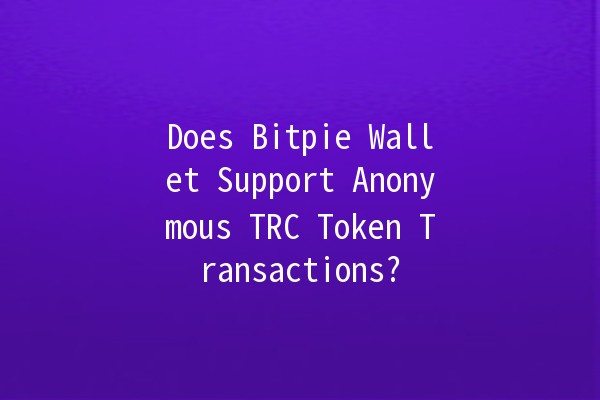




In the everevolving world of cryptocurrency, privacy and anonymity are hot topics that every user must consider. One of the wallets gaining popularity for managing TRC tokens is Bitpie Wallet. This article delves into whether Bitpie Wallet supports anonymous TRC token transactions, how it achieves this, and practical tips to enhance your privacy while using cryptocurrencies.
Before we dive into the specifics of anonymity, it's essential to grasp what TRC tokens are and the overall functionality of Bitpie Wallet.
TRC Tokens
TRC tokens are assets created on the TRON blockchain, which is known for its highspeed transactions and low fees. These tokens have gained traction due to their utility in various decentralized applications (dApps) within the TRON ecosystem.
Bitpie Wallet Overview
Bitpie Wallet is a multicurrency wallet that supports assets on multiple blockchains, including Bitcoin, Ethereum, and TRC tokens. One of its standout features is its userfriendly interface, making it easier for newcomers to engage with cryptocurrencies securely.

The question of anonymity in cryptocurrency transactions is complex. While transactions on most public blockchains (like TRON) are transparent, they offer pseudonymity rather than true anonymity. This means that while your wallet address is not directly tied to your identity, anyone can trace the transaction history associated with that address.
Bitpie Wallet does implement several features that can contribute to user anonymity:
NonCustodial Design: Bitpie Wallet is a noncustodial wallet, giving users complete control over their private keys. This design minimizes the risk of data breaches that some custodial wallets face.
Hierarchical Deterministic (HD) Wallet: The HD wallet architecture allows users to generate new addresses for each transaction, meaning that transactions can be spread across multiple addresses instead of using a single address repeatedly. This practice enhances privacy.
One method users can employ to achieve greater anonymity is through mixing services. Mixing services combine multiple transactions and scramble the coins, making it challenging to trace specific transactions back to their origin. While Bitpie Wallet doesn’t provide a builtin mixing service, users can withdraw tokens to a separate wallet engaged in mixing to enhance their anonymity.
Users looking for enhanced privacy can convert their TRC tokens to privacyfocused cryptocurrencies like Monero or Zcash within the platform that supports such exchanges. Although this is not a feature of Bitpie directly, knowing how to leverage various platforms can help maintain anonymity.
Here are five actionable techniques users can adopt to maintain anonymity while using Bitpie Wallet for TRC token transactions:
Explanation: Instead of using a single wallet for all transactions, distributing your tokens across multiple wallets can dilute the traceability of your transactions.
Example: Open several noncustodial wallets (e.g., Bitpie, Trust Wallet, MetaMask) and transfer small amounts of TRC tokens to these wallets. This practice can confuse anyone trying to trace your transaction history.
Explanation: As mentioned earlier, utilizing the HD wallet feature allows you to create new addresses for your TRC token transactions.
Example: Each time you receive or send TRC tokens, generate a new receiving address instead of using the same one repeatedly. Keeping transactions spread across different addresses makes it harder to link them together.
Explanation: While Bitpie itself doesn’t include a mixing feature, you can rely on external services that offer coin mixing to obfuscate transaction trails.
Example: Use wellknown mixing services to withdraw your TRC tokens before sending them to your desired address. After mixing, the tokens will have no identifiable source.
Explanation: When using cryptocurrency, avoid situations that can tie your blockchain activity to your realworld identity.
Example: If you're asked to provide an email or phone number when creating an account related to your wallet, consider using alternative methods like temporary email services.
Explanation: Using a VPN can add an extra layer of privacy by masking your IP address when you access your wallet online.
Example: Before logging into your Bitpie Wallet, activate your VPN. This action makes it more difficult for anyone to associate your IP address with your cryptocurrency transactions.
Cryptocurrency transactions can be considered anonymous depending on the wallet’s features, address generation practices, and whether or not mixing services are used. Full anonymity is hard to achieve due to the transparent nature of most public blockchains.
While Bitpie Wallet implements several privacy measures, complete anonymity cannot be guaranteed. Users must adopt additional practices to enhance their privacy adequately.
Yes, as a noncustodial wallet, Bitpie provides recovery through a seed phrase. Always keep this seed phrase secure and offline to recover your wallet in case of loss.
Immediately transfer your assets to a new wallet with a different seed phrase and report any suspicious activity to Bitpie support. Regular security practices can help minimize risks.
The legality of mixing services varies by jurisdiction. Always research local regulations regarding cryptocurrency to ensure compliance.
Yes, TRON is designed for speed and lower fees, making TRC token transactions typically faster than Bitcoin transactions due to its more efficient consensus mechanism.
Using Bitpie Wallet can offer a degree of privacy for TRC token transactions, but users must take proactive steps to maximize their anonymity. By employing the techniques outlined and understanding the nuances of cryptocurrency transactions, you can navigate the digital financial landscape with more confidence and security.